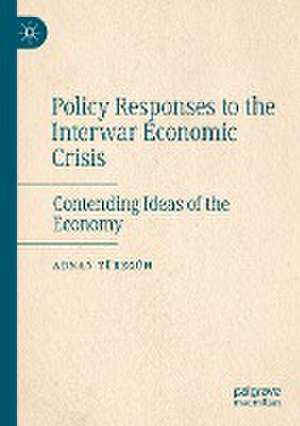Policy Responses to the Interwar Economic Crisis: Contending Ideas of the Economy
Autor Adnan Türegünen Limba Engleză Paperback – 4 apr 2023
| Toate formatele și edițiile | Preț | Express |
|---|---|---|
| Paperback (1) | 695.34 lei 6-8 săpt. | |
| Springer International Publishing – 4 apr 2023 | 695.34 lei 6-8 săpt. | |
| Hardback (1) | 700.75 lei 6-8 săpt. | |
| Springer International Publishing – 2 apr 2022 | 700.75 lei 6-8 săpt. |
Preț: 695.34 lei
Preț vechi: 818.04 lei
-15% Nou
Puncte Express: 1043
Preț estimativ în valută:
133.07€ • 137.47$ • 110.75£
133.07€ • 137.47$ • 110.75£
Carte tipărită la comandă
Livrare economică 26 martie-09 aprilie
Preluare comenzi: 021 569.72.76
Specificații
ISBN-13: 9783030969554
ISBN-10: 303096955X
Pagini: 294
Ilustrații: XVII, 294 p.
Dimensiuni: 148 x 210 mm
Greutate: 0.38 kg
Ediția:1st ed. 2022
Editura: Springer International Publishing
Colecția Palgrave Macmillan
Locul publicării:Cham, Switzerland
ISBN-10: 303096955X
Pagini: 294
Ilustrații: XVII, 294 p.
Dimensiuni: 148 x 210 mm
Greutate: 0.38 kg
Ediția:1st ed. 2022
Editura: Springer International Publishing
Colecția Palgrave Macmillan
Locul publicării:Cham, Switzerland
Cuprins
Preface.- 1. The Interwar Economic Crisis in Comparative Research Perspective.- 2. Limits of the Possible for Economic Policy Choice.- 3. Protectionism: A Safe Haven or Missed Opportunity?.- 4. Proto-Fordism: Seizing the Moment under Democracy.- 5. Neomercantilism, Mark I, under Dictatorship with an Agro-Industrial Base.- 6. Neomercantilism, Mark II, under Dictatorship of the Bureaucracy.- 7. Conclusion.
Notă biografică
Adnan Türegün is Adjunct Research Professor in the Department of Sociology and Anthropology at Carleton University, Canada. His research interests include historical sociology, social stratification, professionalization, and immigrant economic integration.
Textul de pe ultima copertă
“Türegün’s Policy Responses to the Interwar Economic Crisis makes an important contribution to the comparative political economy of public policy literature. While his focus is on what shaped national responses to the interwar economic crisis, it raises questions about the current period, which is also marked by an ongoing crisis of the hitherto hegemonic neo-liberal paradigm unleashed by global economic turbulence, now exacerbated by COVID-19. In this period, too, we see the rise of protectionism, this time with a strong anti-migrant aspect. Türegün’s book forces us to ask how have things changed and what remains the same?”
-Rianne Mahon, Distinguished Research Professor, Carleton University, Canada.
“An original and provocative interpretation of the policy alternatives and paradigms on offer during the interwar crisis. Türegün’s nuanced account probes and illuminates the complex interplay between material interests and politicalprograms and ideas, in a variety of national cases.”
-Stephen McBride, Professor and Canada Research Chair in Public Policy and Globalization, McMaster University, Canada.
This book is about national economic policy responses to the Great Depression of the interwar period. Taking off from a generally liberal starting point in the 1920s, states diverged greatly in their responses. Some were daring while others remained conservative. The two groups further differed among themselves in both degree and kind. The book gives a certain shape to this messy reality by identifying broad policy patterns (paradigms), and offers an explanation of it which emphasizes the ideational disposition of policy actors while recognizing the context that limits what they can do. More specifically, it argues that the ideas held by rulers and the strategies they consequently developed regarding three major groups of interest – business, labour, and, most critically, agrarians – largely determined economic policy variation across nations.
Adnan Türegün is Adjunct Research Professor in the Department of Sociology and Anthropology at Carleton University, Canada. His research interests include historical sociology, social stratification, professionalization, and immigrant economic integration.
-Rianne Mahon, Distinguished Research Professor, Carleton University, Canada.
“An original and provocative interpretation of the policy alternatives and paradigms on offer during the interwar crisis. Türegün’s nuanced account probes and illuminates the complex interplay between material interests and politicalprograms and ideas, in a variety of national cases.”
-Stephen McBride, Professor and Canada Research Chair in Public Policy and Globalization, McMaster University, Canada.
This book is about national economic policy responses to the Great Depression of the interwar period. Taking off from a generally liberal starting point in the 1920s, states diverged greatly in their responses. Some were daring while others remained conservative. The two groups further differed among themselves in both degree and kind. The book gives a certain shape to this messy reality by identifying broad policy patterns (paradigms), and offers an explanation of it which emphasizes the ideational disposition of policy actors while recognizing the context that limits what they can do. More specifically, it argues that the ideas held by rulers and the strategies they consequently developed regarding three major groups of interest – business, labour, and, most critically, agrarians – largely determined economic policy variation across nations.
Adnan Türegün is Adjunct Research Professor in the Department of Sociology and Anthropology at Carleton University, Canada. His research interests include historical sociology, social stratification, professionalization, and immigrant economic integration.
Caracteristici
Examines the economic policy responses of states to the Great Depression of the interwar period Identifies broad policy patterns and offers an explanation which emphasizes the ideational disposition of actors Argues that ideas regarding business and labour largely determined economic policy variation across nations
